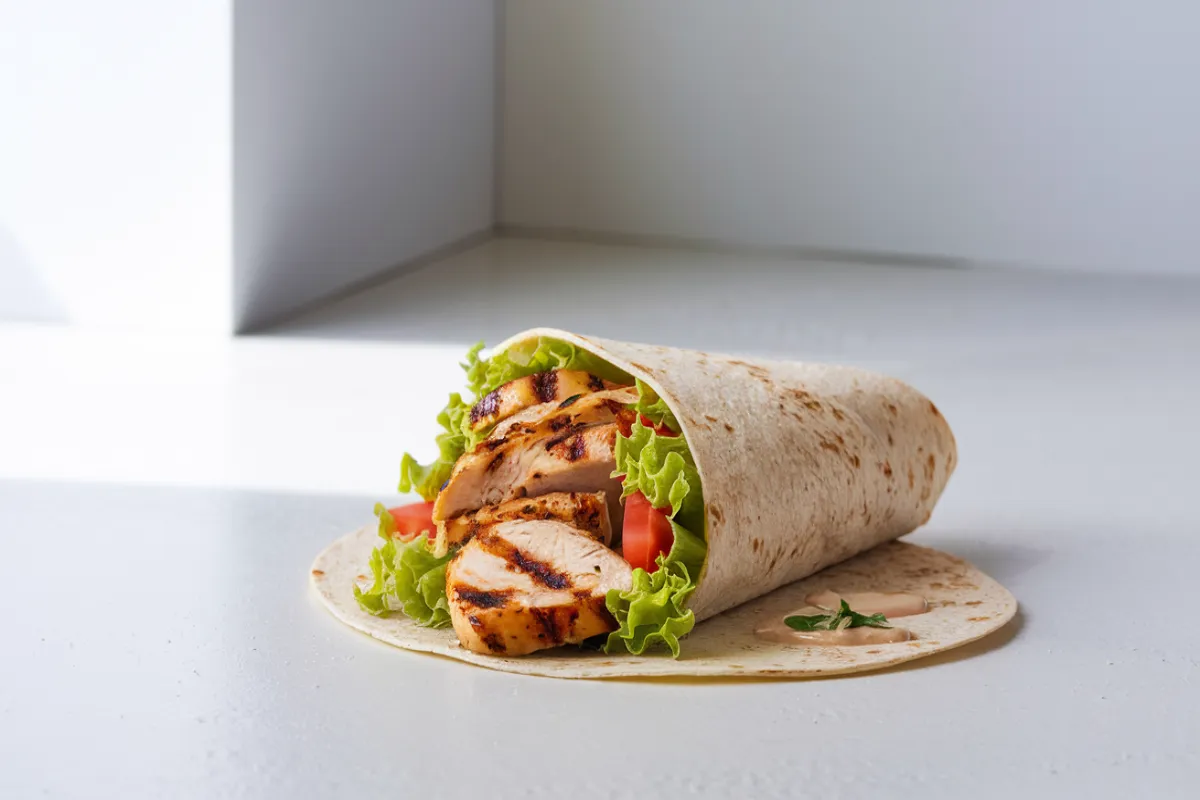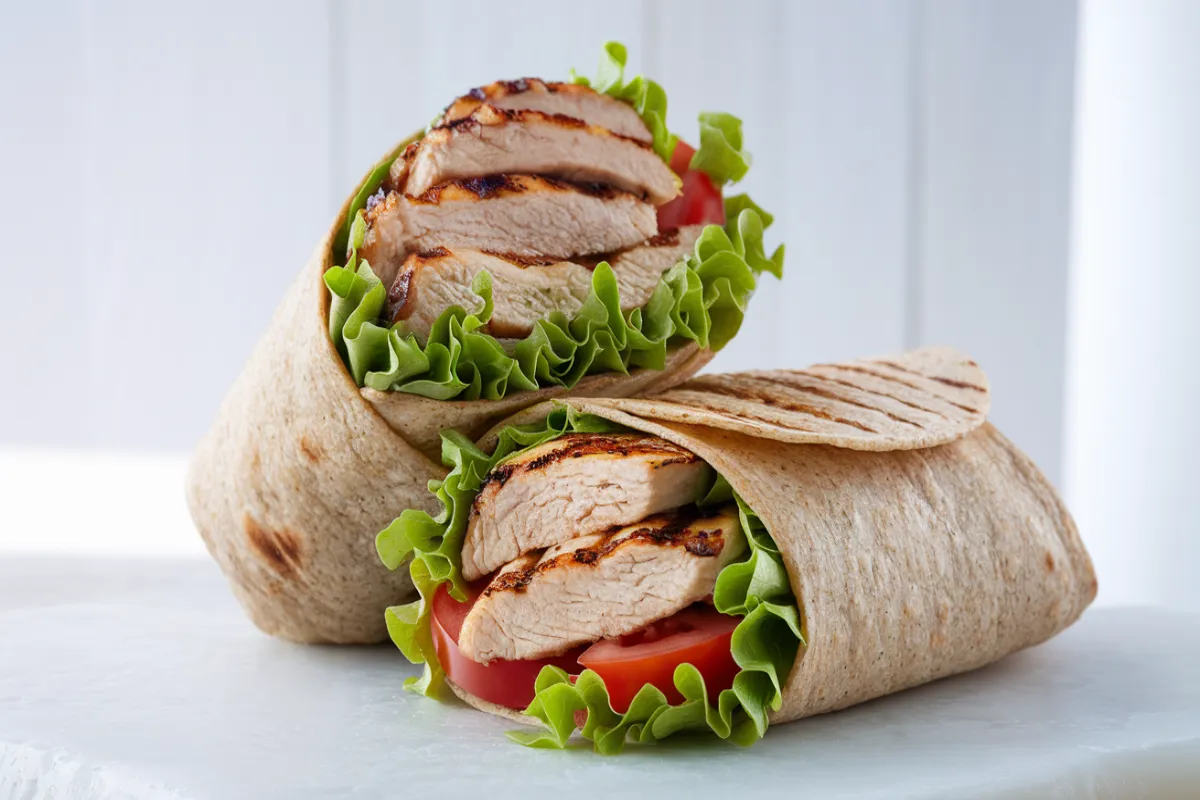Grilled chicken wraps are a popular choice for many people looking for a quick, tasty, and seemingly healthy meal option. But just how healthy is a grilled chicken wrap? In this comprehensive article, we’ll dive deep into the nutritional value, benefits, and potential drawbacks of this dish. We’ll also explore how to make your grilled chicken wrap as healthy as possible and whether it can fit into various dietary plans.
Table of Contents:
- Introduction
- What is a Grilled Chicken Wrap?
- Popularity and Appeal
- Nutritional Breakdown of a Grilled Chicken Wrap
- Macronutrients: Protein, Carbohydrates, and Fats
- Micronutrients: Vitamins and Minerals
- Calories: A Detailed Look
- Health Benefits of Grilled Chicken Wraps
- High Protein Content
- Balanced Macronutrient Ratio
- Source of Essential Nutrients
- Potential Drawbacks of Grilled Chicken Wraps
- Sodium Content
- Caloric Density
- Possible Additives and Preservatives
- Comparing Grilled Chicken Wraps to Other Fast Food Options
- Grilled Chicken Wrap vs. Fried Chicken Sandwich
- Grilled Chicken Wrap vs. Burger
- Grilled Chicken Wrap vs. Salad
- How to Make a Grilled Chicken Wrap Healthier
- Choosing Whole-Grain Wraps
- Adding More Vegetables
- Opting for Low-Fat Dressings
- Grilled Chicken Wraps and Weight Management
- Role in a Calorie-Controlled Diet
- Satiety and Hunger Control
- Portion Control Tips
- Grilled Chicken Wraps for Specific Diets
- Low-Carb Diets
- Gluten-Free Diets
- Mediterranean Diet
- Common Ingredients in Grilled Chicken Wraps
- Chicken: Type and Preparation
- Wraps: Types and Nutrition
- Vegetables and Condiments
- Grilled Chicken Wraps: Store-Bought vs. Homemade
- Nutritional Differences
- Convenience vs. Control
- Cost Considerations
- Popular Variations of Grilled Chicken Wraps
- Spicy Grilled Chicken Wrap
- Mediterranean Grilled Chicken Wrap
- BBQ Grilled Chicken Wrap
- How to Pair a Grilled Chicken Wrap with Sides and Drinks
- Healthy Side Options
- Beverage Pairings
- Avoiding Common Pitfalls
- Grilled Chicken Wraps and Athletic Performance
- Protein for Muscle Recovery
- Carbohydrates for Energy
- Hydration and Nutrient Timing
- The Environmental Impact of Grilled Chicken Wraps
- Sourcing Sustainable Chicken
- Packaging Considerations
- Reducing Food Waste
- Conclusion: Is a Grilled Chicken Wrap Healthy for You?
- FAQs
- Is a grilled chicken wrap good for weight loss?
- Can grilled chicken wraps be part of a low-carb diet?
- What’s the best type of wrap to use for a healthy grilled chicken wrap?
- How many calories are typically in a grilled chicken wrap?
- Are there gluten-free options for grilled chicken wraps?
Introduction
What is a Grilled Chicken Wrap?
A grilled chicken wrap is a meal that consists of grilled chicken pieces, typically combined with various vegetables and condiments, all wrapped in a tortilla or flatbread. This dish is known for its versatility, as it can be customized with a wide range of ingredients to suit different tastes and dietary preferences.
Popularity and Appeal
Grilled chicken wraps have become a staple in many restaurants and fast-food chains, praised for their combination of convenience, flavor, and perceived health benefits. They are often seen as a healthier alternative to more indulgent fast-food options, making them a go-to choice for those looking to maintain a balanced diet without sacrificing taste.
Nutritional Breakdown of a Grilled Chicken Wrap
Macronutrients: Protein, Carbohydrates, and Fats
A typical grilled chicken wrap offers a balanced mix of macronutrients. Here’s what you can expect:
- Protein: The chicken in the wrap is a rich source of protein, which is essential for muscle repair and growth. A standard wrap can provide anywhere from 20 to 30 grams of protein, depending on the portion size and additional ingredients.
- Carbohydrates: The wrap itself, often made from flour or whole grains, is the primary source of carbohydrates. This provides energy and helps to make the meal more filling. Carbohydrate content can vary, but typically ranges from 30 to 50 grams per wrap.
- Fats: The fat content in a grilled chicken wrap depends largely on the type of chicken used (skin-on vs. skinless) and any added ingredients like cheese or dressings. Expect to find around 10 to 20 grams of fat, with the potential for more if higher-fat condiments are included.
Micronutrients: Vitamins and Minerals
Grilled chicken wraps are also a source of various vitamins and minerals. Vegetables like lettuce, tomatoes, and peppers add vitamins A, C, and K, along with essential minerals like potassium and magnesium. The chicken contributes B vitamins, particularly niacin and B6, which are important for energy metabolism.
Calories: A Detailed Look
The calorie content of a grilled chicken wrap can vary significantly based on its ingredients. A basic grilled chicken wrap might contain around 300 to 400 calories, but this can easily increase with added sauces, cheese, or higher-calorie wraps. For those watching their calorie intake, it’s crucial to pay attention to portion sizes and added extras.
Health Benefits of Grilled Chicken Wraps
High Protein Content
One of the standout benefits of a grilled chicken wrap is its high protein content. Protein is crucial for muscle repair, immune function, and overall body maintenance. For those looking to build or maintain muscle, a grilled chicken wrap can be an excellent choice post-workout.
Balanced Macronutrient Ratio
A well-constructed grilled chicken wrap offers a balanced ratio of macronutrients, which can help keep you full and energized throughout the day. This balance is important for maintaining steady blood sugar levels and avoiding energy crashes.
Source of Essential Nutrients
In addition to macronutrients, grilled chicken wraps provide essential vitamins and minerals. These nutrients support various bodily functions, from maintaining healthy skin to supporting the immune system.
Potential Drawbacks of Grilled Chicken Wraps
Sodium Content
One potential downside of grilled chicken wraps, especially those from fast-food chains, is their sodium content. High sodium levels can contribute to hypertension and other cardiovascular issues. It’s essential to be mindful of this, particularly if you’re consuming other sodium-rich foods throughout the day.
Caloric Density
While grilled chicken wraps can be healthy, they can also be calorie-dense, especially when loaded with cheese, creamy dressings, or large wraps. This can make them less suitable for those on a strict calorie-controlled diet.
Possible Additives and Preservatives
Many store-bought or restaurant wraps contain additives and preservatives to extend shelf life or enhance flavor. These ingredients might not contribute to the healthfulness of the meal and can be a concern for those trying to eat clean.

Comparing Grilled Chicken Wraps to Other Fast Food Options
Grilled Chicken Wrap vs. Fried Chicken Sandwich
Compared to a fried chicken sandwich, a grilled chicken wrap is generally a healthier option. The grilling process reduces fat content and calories while preserving the chicken’s protein content. Additionally, wraps often include more vegetables, contributing to their overall nutritional value.
Grilled Chicken Wrap vs. Burger
When compared to a typical fast-food burger, a grilled chicken wrap is often lower in saturated fats and calories. The wrap’s balance of protein, carbohydrates, and fats makes it a more balanced meal option.
Grilled Chicken Wrap vs. Salad
Salads are often seen as the epitome of health food, but a grilled chicken wrap can be just as nutritious if prepared thoughtfully. Unlike many salads that rely on high-calorie dressings for flavor, wraps can offer a more balanced macronutrient profile, making them more satiating.
How to Make a Grilled Chicken Wrap Healthier
Choosing Whole-Grain Wraps
One of the easiest ways to boost the healthiness of your grilled chicken wrap is by choosing a whole-grain wrap. Whole grains are higher in fiber, which aids digestion and helps you feel fuller for longer.
Adding More Vegetables
Incorporating a variety of vegetables into your wrap not only enhances flavor but also increases the meal’s nutrient density. Leafy greens, bell peppers, cucumbers, and tomatoes are all excellent choices.
Opting for Low-Fat Dressings
Many grilled chicken wraps come with high-calorie, high-fat dressings. Opt for low-fat or yogurt-based dressings to keep the calorie count in check while still enjoying a flavorful meal.
Grilled Chicken Wraps and Weight Management
Role in a Calorie-Controlled Diet
Grilled chicken wraps can be a great option for those on a calorie-controlled diet, provided they are mindful of portion sizes and ingredient choices. A wrap that balances lean protein with vegetables and whole grains can help you stay within your daily calorie limits without feeling deprived.
Satiety and Hunger Control
The combination of protein, fiber, and healthy fats in a grilled chicken wrap can help keep hunger at bay. This makes it a suitable option for lunch or dinner, especially if you’re trying to avoid snacking between meals.
Portion Control Tips
To manage portion sizes, consider using smaller wraps or dividing a large wrap into two portions. Additionally, being mindful of the amount of sauce or dressing you add can significantly reduce the calorie content.
Grilled Chicken Wraps for Specific Diets
Low-Carb Diets
For those following a low-carb diet, a grilled chicken wrap can still be a viable option. Simply swap out the traditional wrap for a low-carb alternative, such as lettuce leaves or a low-carb tortilla.
Gluten-Free Diets
If you’re on a gluten-free diet, look for gluten-free wraps made from alternative flours like almond or coconut. Ensure that the grilled chicken and other ingredients are also free from gluten-containing additives.
Mediterranean Diet
A grilled chicken wrap can fit seamlessly into a Mediterranean diet by incorporating ingredients like olive oil, fresh vegetables, and whole grains. This diet emphasizes balance and nutrient-rich foods, making the wrap a perfect match.
Common Ingredients in Grilled Chicken Wraps
Chicken: Type and Preparation
The type of chicken used in a wrap can significantly affect its nutritional value. Opting for skinless, grilled chicken breast is one of the healthiest choices, providing lean protein with minimal fat.
Wraps: Types and Nutrition
Wraps come in various forms, from traditional flour tortillas to whole-grain and gluten-free options. The nutritional content of the wrap itself can vary, so it’s important to choose one that aligns with your dietary needs.
Vegetables and Condiments
Vegetables are a key component of a healthy grilled chicken wrap. They add fiber, vitamins, and minerals without adding many calories. Condiments like mustard, hummus, or salsa can enhance flavor without the added fat and calories of creamy dressings.
Grilled Chicken Wraps: Store-Bought vs. Homemade
Nutritional Differences
Homemade grilled chicken wraps allow you to control the ingredients, making them generally healthier than store-bought versions. Store-bought wraps often contain higher levels of sodium, preservatives, and less nutrient-dense ingredients.
Convenience vs. Control
While store-bought wraps offer convenience, making your wrap at home gives you complete control over what goes into it. This allows you to tailor the wrap to your specific dietary needs and preferences.
Cost Considerations
Homemade wraps can also be more cost-effective, especially if you’re preparing them regularly. Buying ingredients in bulk and using them for multiple meals can reduce the overall cost per wrap.
Popular Variations of Grilled Chicken Wraps
Spicy Grilled Chicken Wrap
For those who enjoy a bit of heat, a spicy grilled chicken wrap is a great option. Add some jalapeños or a spicy sauce like sriracha to kick up the flavor while still keeping the wrap healthy.
Mediterranean Grilled Chicken Wrap
A Mediterranean-style wrap might include ingredients like hummus, feta cheese, olives, and a drizzle of olive oil. These ingredients align well with the Mediterranean diet and add a unique, flavorful twist to the standard grilled chicken wrap.
BBQ Grilled Chicken Wrap
A BBQ grilled chicken wrap incorporates barbecue sauce for a smoky, sweet flavor. Be mindful of the sauce’s sugar content, and consider making your own low-sugar version to keep the wrap healthier.
How to Pair a Grilled Chicken Wrap with Sides and Drinks
Healthy Side Options
Pairing your grilled chicken wrap with a healthy side can create a balanced meal. Consider sides like a fresh green salad, roasted vegetables, or a fruit salad to complement the wrap’s flavors and nutrition.
Beverage Pairings
For beverages, water, unsweetened iced tea, or a light fruit-infused water are excellent choices. These options help you stay hydrated without adding unnecessary calories or sugars.
Avoiding Common Pitfalls
Be cautious with sides and drinks that are high in sugar, fat, or calories, as they can turn a healthy meal into a more indulgent one. Avoid options like soda, chips, or creamy coleslaw, which can add unnecessary calories and fat.
Grilled Chicken Wraps and Athletic Performance
Protein for Muscle Recovery
For athletes, the high protein content of a grilled chicken wrap makes it an ideal post-workout meal. Protein aids in muscle repair and growth, helping you recover faster and perform better in future workouts.
Carbohydrates for Energy
The carbohydrates in the wrap provide the energy needed for intense physical activity. Eating a grilled chicken wrap before a workout can help fuel your performance, while consuming it afterward can replenish glycogen stores.
Hydration and Nutrient Timing
Staying hydrated is crucial for athletic performance. Pair your wrap with plenty of water and consider timing your meal to maximize nutrient absorption and energy levels.
The Environmental Impact of Grilled Chicken Wraps
Sourcing Sustainable Chicken
Choosing chicken that has been sustainably sourced can reduce the environmental impact of your meal. Look for labels like “organic” or “free-range,” which indicate more environmentally friendly farming practices.
Packaging Considerations
If you’re buying a grilled chicken wrap from a store or restaurant, consider the packaging. Opt for options with minimal or recyclable packaging to reduce waste.
Reducing Food Waste
When making wraps at home, be mindful of food waste. Use leftovers creatively, and only prepare what you plan to eat to minimize waste.
Conclusion: Is a Grilled Chicken Wrap Healthy for You?
In conclusion, a grilled chicken wrap can be a healthy addition to your diet, offering a good balance of protein, carbohydrates, and fats, along with essential vitamins and minerals. However, its healthfulness largely depends on the ingredients and portion sizes you choose. By opting for whole-grain wraps, plenty of vegetables, and low-fat dressings, you can enjoy a nutritious, satisfying meal that fits into various dietary plans. Whether you’re looking to manage your weight, fuel athletic performance, or simply enjoy a tasty meal, a grilled chicken wrap can be a versatile and health-conscious choice.
FAQs
Is a grilled chicken wrap good for weight loss?
Yes, a grilled chicken wrap can be good for weight loss if it’s made with lean chicken, whole-grain wraps, and plenty of vegetables. Keeping an eye on portion sizes and avoiding high-calorie dressings will help keep it low in calories.
Can grilled chicken wraps be part of a low-carb diet?
Absolutely! Simply substitute the regular wrap with a low-carb alternative, like lettuce leaves or a low-carb tortilla, to fit it into a low-carb diet.
What’s the best type of wrap to use for a healthy grilled chicken wrap?
Whole-grain wraps are generally the best option as they are higher in fiber and nutrients compared to white flour wraps. Gluten-free wraps made from alternative flours are also a good choice for those with gluten sensitivities.
How many calories are typically in a grilled chicken wrap?
The calorie content can vary, but a typical grilled chicken wrap might contain between 300 to 500 calories, depending on the ingredients used and portion sizes.
Are there gluten-free options for grilled chicken wraps?
Yes, there are many gluten-free wraps available on the market made from ingredients like almond flour, coconut flour, or rice flour. Be sure to check the labels to ensure all ingredients are gluten-free.

